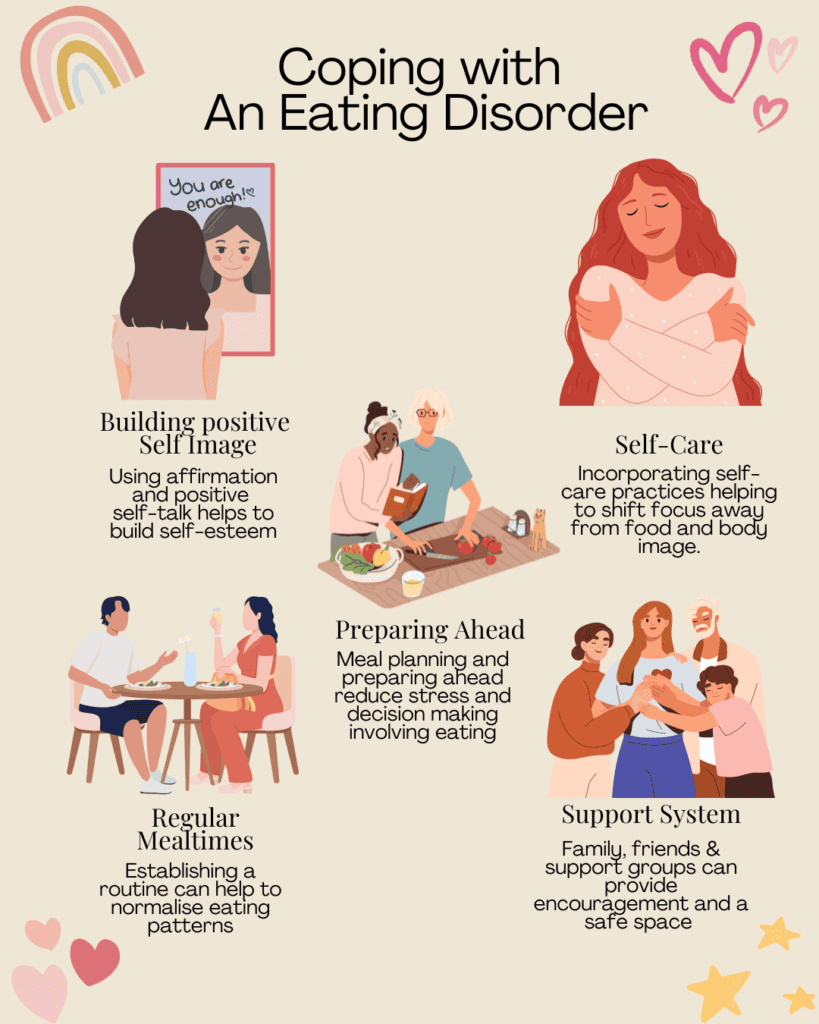Last Updated on: 8th January 2026, 08:03 am
This article was written by Associate Registered Nutritionist (ANutr) Cherie Ko, and reviewed by Registered Dietitian, Sarah Idakwo
Table of Contents
What Are Eating Disorders?
Eating disorders are complex mental health conditions marked by severe disturbances to one’s eating behaviours. An individual suffering from an eating disorder often uses the control of food to cope with feelings and other situations, and could also have distorted thoughts and emotions related to food, body image, and weight (1,2).

Why is it important to recognise eating disorders?
Eating disorders are not a choice, and are critical due to their serious implications on health and quality of life. Eating disorders are highly complex and can lead to other serious conditions affecting physical health, psychological well-being, and social function that can pose long term health risk and consequences (2)
Recognising the signs or symptoms of eating disorders can help with early detection, and to receive appropriate care and support, which could help to reduce the risk of severe health complications due to eating disorders.
Understanding Different Types of Eating Disorders
In this blog, we will discuss several common types of eating disorders. Each of these disorders is associated with different but sometimes overlapping symptoms.
Anorexia nervosa
Anorexia nervosa (often called anorexia) is the most well-known eating disorder. It can be characterised by a relentless pursuit of thinness, extreme fear of gaining weight, and a distorted body image, such as thinking they’re fat even when they’re underweight, in the context of extreme low weight
Health risks associated with anorexia
A person suffering with anorexia long term may develop health problems associated with malnutrition which can be fatal, affect regular growth and development, and fertility (3).
Bulimia nervosa
Bulimia nervosa, similar to Anorexia nervosa, is an eating disorder where a person is excessively focused on the shape of their body, their weight and thoughts of food. Unlike anorexia nervosa, a person with bulimia nervosa can be slightly underweight, normal weight, overweight or even obese.
It is common for family members or friends to not know that a person has bulimia nervosa because their behaviours are hidden and may go unnoticed, and they do not appear underweight (4).
Health risks associated with Bulimia nervosa
Bulimia nervosa can lead to rare but potentially fatal complications like stroke or heart attack, but also gastrointestinal, dental, and esophageal issues due to purging(5)
Binge eating disorder (BED)
Binge eating disorder involves the sense of ‘losing control’ over one’s eating and consuming a large amount of food beyond fullness within a short duration of time. The behaviour is usually secretive and associated with feelings of shame, disgust, embarrassment and low self esteem (6).
Health risks associated with Binge eating disorder
Binge eating disorder poses significant physical and psychological health risks. Physically, it can lead to obesity, type 2 diabetes, cardiovascular disease, gastrointestinal & digestive issues, musculoskeletal problems, sleep apnea, and metabolic syndrome. A person with binge eating disorder may also suffer from mental health problems such as depression, anxiety, substance abuse, social isolation, and impulsive behaviours, and can often coexist with other mental health conditions (7).
Other specified feeding and eating disorders (OSFED)
Other specified feeding and eating disorders (OSFED) is a category for eating disorders which encompasses a range of disordered eating behaviours that do not meet the full criteria for other eating disorders but still cause significant distress or impairment. Despite not fitting into these categories, OSFED conditions are serious and can have significant health consequences. Some key disorders under this category include purging disorder, night eating syndrome, atypical anorexia, and low frequency or limited duration bulimia nervosa and binge eating disorder. (8)
How eating disorders can manifest
The development of eating disorders can be influenced by a complex interplay of various factors. This includes biological, psychological, environmental, and socio-cultural factors, which all could have a role in the development of and increasing vulnerability to eating disorders.
Who is at risk?
Eating disorders can affect people of all ages, racial/ethnic backgrounds, body weights, and genders. Individuals with a family history of eating disorders or other mental health conditions, may be at a higher risk of developing eating disorders.
Eating disorders tend to develop during teenage and adolescent years, as it is also a time marked by significant changes in many aspects. Eating disorders are also statistically more prevalent in females, particularly in the development of anorexia nervosa and bulimia nervosa, but it can still affect all genders.
Likewise, while eating disorders tend to develop during teenage and adolescent years, as it is a time marketed with significant changes, it may also develop during childhood or later in life. Moreover, having low self-esteem, perfectionism, and negative body image can play a significant role in the development and maintenance of eating disorders (9).
Stress and Eating Disorders
Stress is a significant factor in the development of eating disorders. When individuals experience high levels of stress, they may turn to disordered eating behaviours as a coping mechanism. Stress can trigger feelings of being out of control, and controlling food intake or engaging in binge eating can provide a temporary sense of control or comfort. Chronic stress can also alter hormone levels, such as cortisol, which can affect appetite and metabolism, further contributing to the onset of eating disorders.(10)
Cultural and Social Pressures and Eating Disorders
Societal pressures and cultural norms can play a crucial role in the manifestation of eating disorders. In many societies, thinness, physical appearance and unrealistic body standards may be glorified, and high value may be associated with these standards.

Similarly, peer pressure, the desire to fit in or gain acceptance, comments about weight, body shape, or eating habits from peers or family members may make individuals feel compelled to conform to these pressures by engaging in unhealthy eating practices and further reinforce the need to achieve unrealistic standards (11).
Social Media and Diet Culture
Media and social media plays a pivotal role in shaping body image ideas. The promotion of unrealistic beauty standards and the constant exposure to images of thin and toned bodies that are highlighted as the ideal can lead to body dissatisfaction, particularly among impressionable young people. The constant comparison and pressure to conform to these ideas would drive individuals to engage in unhealthy eating patterns and can encourage disordered eating behaviours (12).

Similarly, diet culture, known as the focus on weight loss and dieting, often equates thinness with health and moral virtues. Associating an individual’s value with their body shape and size, has encouraged restrictive eating patterns and unhealthy eating behaviours. Diet culture has also been associated with fad diets, detox programmes, and the use of weight loss supplements in order to conform to these ideals.
These pressures can contribute to an environment where body dissatisfaction is common, and unhealthy eating behaviours are normalised or even encouraged.
Professional and Peer Pressures
Being in certain professions or hobbies, such as being an athlete, a dancer, or a model, may have a greater emphasis on physical appearance and weight as part of the
profession. Similarly, being in predominantly female professions could increase vulnerability to the pressures of modifying appearance or conforming to social norms for acceptance.This pressure can lead to restrictive eating, excessive exercise, and other disordered behaviours as individuals attempt to meet these expectations (13).
Finding Help
Treating eating disorders effectively often requires a comprehensive, multidisciplinary approach. This means involving various healthcare professionals working together to address the complex needs of the individual.
Role of Dietitians, Therapists, and Medical Professionals

To treat eating disorders, Dietitians, Therapists, and Medical Professionals, all play a critical role in using a combination of medical care, nutritional counselling, and psychological therapy to ensure all aspects of the disorder are addressed.
Dietitians are responsible for nutritional counselling and nutritional therapy. This involved gradual refeeding, addressing nutritional deficiencies and ensuring the patient receives balanced and adequate nutrition. A dietitian also supports an individual suffering from an eating disorder to normalise their eating patterns and address any food fears or misconceptions.
Mental health professionals, such as psychologists or counsellors, provide therapy to address the underlying psychological issues contributing to the eating disorder. Therapeutic approaches such as Cognitive Behavioral Therapy (CBT) are often used to change unhealthy eating behaviours and distorted thinking patterns related to food, body image, and self-worth, but also to address other mental health conditions that could occur alongside an eating disorder, such as anxiety, depression or substance abuse. Addressing this aspect of eating disorders are crucial for long term recovery. Improvements in mental health can help individuals develop healthier coping mechanisms, enhance self-esteem, and build resilience against triggers that may lead to an eating disorder.
Lastly, medical Professionals monitor the physical health of patients, managing any medical complications arising from the eating disorder. This could include regular health check-ups to track progress and prevent severe health consequences.
Living with an Eating Disorder
Recovery from an eating disorder is often a non-linear process, and having relapses and setbacks are common as part of the process. In order to manage these challenges, it is important to be grounded in self compassion practices, maintain regular follow-ups with healthcare providers, learn and utilize coping strategies as well as having a strong support system to serve as encouragement and accountability.
Coping strategies for living with an eating disorder

Managing Meal Times
One of the most significant challenges for individuals with eating disorders is managing meal times. Anxiety and fear around food can make eating a distressing experience.
To overcome meal time challenges, some strategies can include meal planning and preparing in advance to reduce stress and decision making involving eating, establishing a routine with set meals and snacks to normalise eating patterns, and to practise mindfulness and intuitive eating during meals to reconnect with hunger and fullness cues.
Dealing with Body Image Issues
Body image issues are central to many eating disorders and can affect daily life significantly. Strategies to manage these challenges include challenging negative thoughts about body image, using affirmations and positive self-talk to build self-esteem, and reducing exposure to media or environments that promote unrealistic body standards.
In addition, engaging in non-compulsive activities that are enjoyable and not driven by the need to burn calories or control weight can help to cope with certain symptoms of eating disorders. Some activities can include walking, yoga, dancing, or any other form of movement that feels good are good options to help
Handling Social Situations
Social interactions can be particularly stressful for individuals with eating disorders, especially those involving food. To make social situations less stressful, one can Planning ahead for social events by discussing food options with the host or bringing a safe dish to share can alleviate anxiety, bring a supportive friend or family member to social gatherings can provide comfort and encouragement, and learn to say no to situations that feel overwhelming or triggering, and knowing that it’s okay to prioritise mental health.
Importance of routine and self-care
Establishing a daily routine and prioritising self-care are crucial components of managing an eating disorder. These practices provide structure and promote overall well-being.
Incorporating more self-care practices into your daily routine can also be helpful in managing an eating disorder. For example, pursuing hobbies and interests that bring joy and fulfilment, helping to shift focus away from food and body image.
Engaging in activities like yoga, deep breathing exercises, meditation, or progressive muscle relaxation, which emphasise the connection between mind and body, can be particularly beneficial as they promote mindfulness and body awareness without the pressure, while also helping to manage stress and anxiety.
In addition, creating consistent meal times, establishing a regular sleep schedule and engaging in non-compulsive activities that are enjoyable, can help to create a structure and routine, but also creates an environment where nutritional and mental health and wellbeing can be improved.
Support Systems
Having a good support system plays a vital role in supporting individuals with eating disorders. Family and friends can offer emotional support, encouragement, and practical assistance, while support groups can provide a safe space to share experiences, gain insights from others facing similar challenges, and receive encouragement.
Involving friends and family in the process can also help them understand the disorder better and learn how to provide appropriate support without enabling disordered behaviours.
Conclusion
This comprehensive guide covers the essential aspects of eating disorders, from understanding different types to recognizing the causes and outlining effective treatment options. We encourage anyone struggling with an eating disorder, or who knows someone who is, to seek professional help.
Take the First Step Towards Recovery Today
Are you or a loved one struggling with an eating disorder? Understanding these complex conditions is the first step toward recovery.
Remember, recovery is possible, and taking the first step is the most important part of the journey. Reach out to our team today here to schedule your free discovery call and start your journey towards a healthier, happier life.


